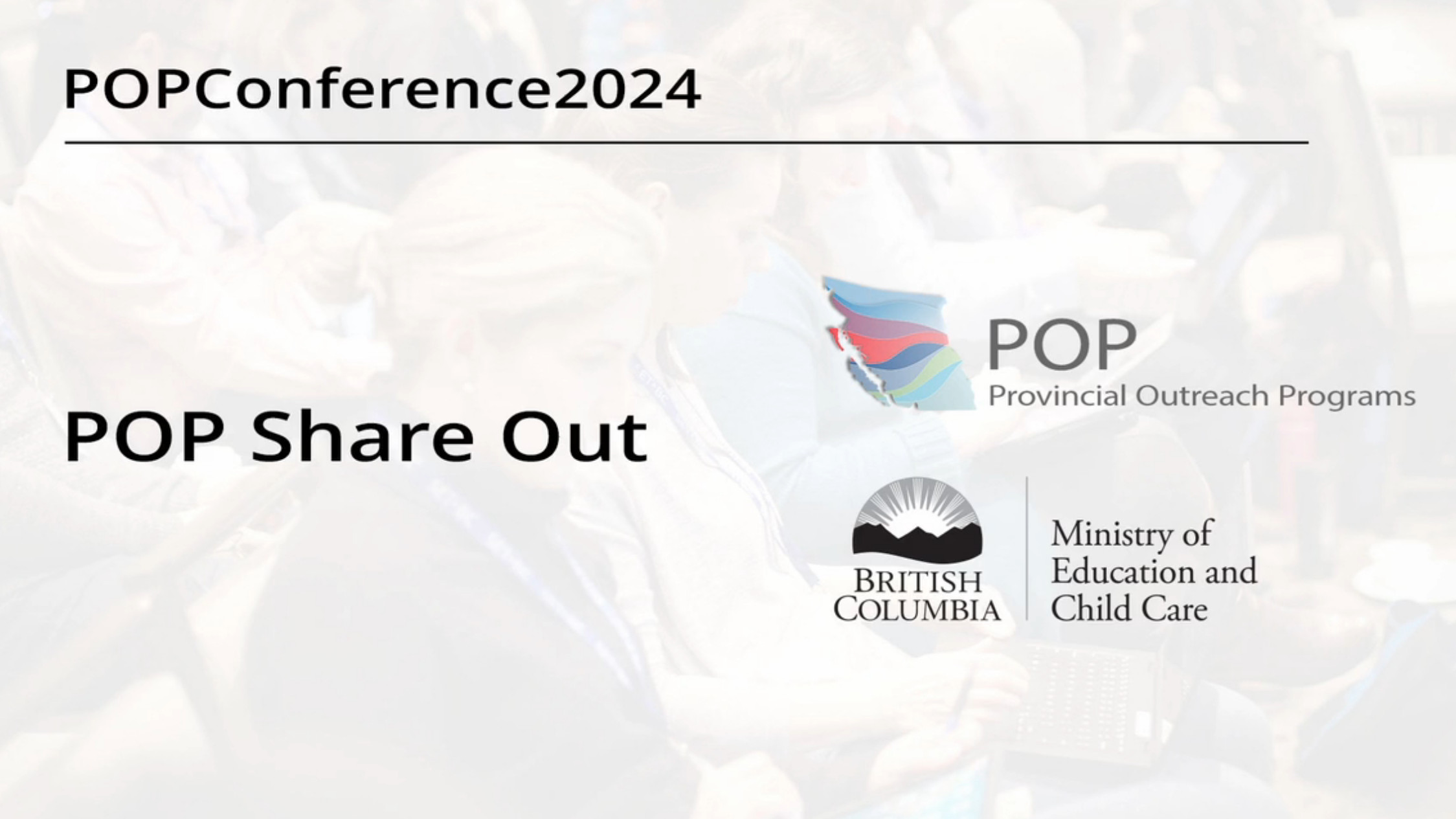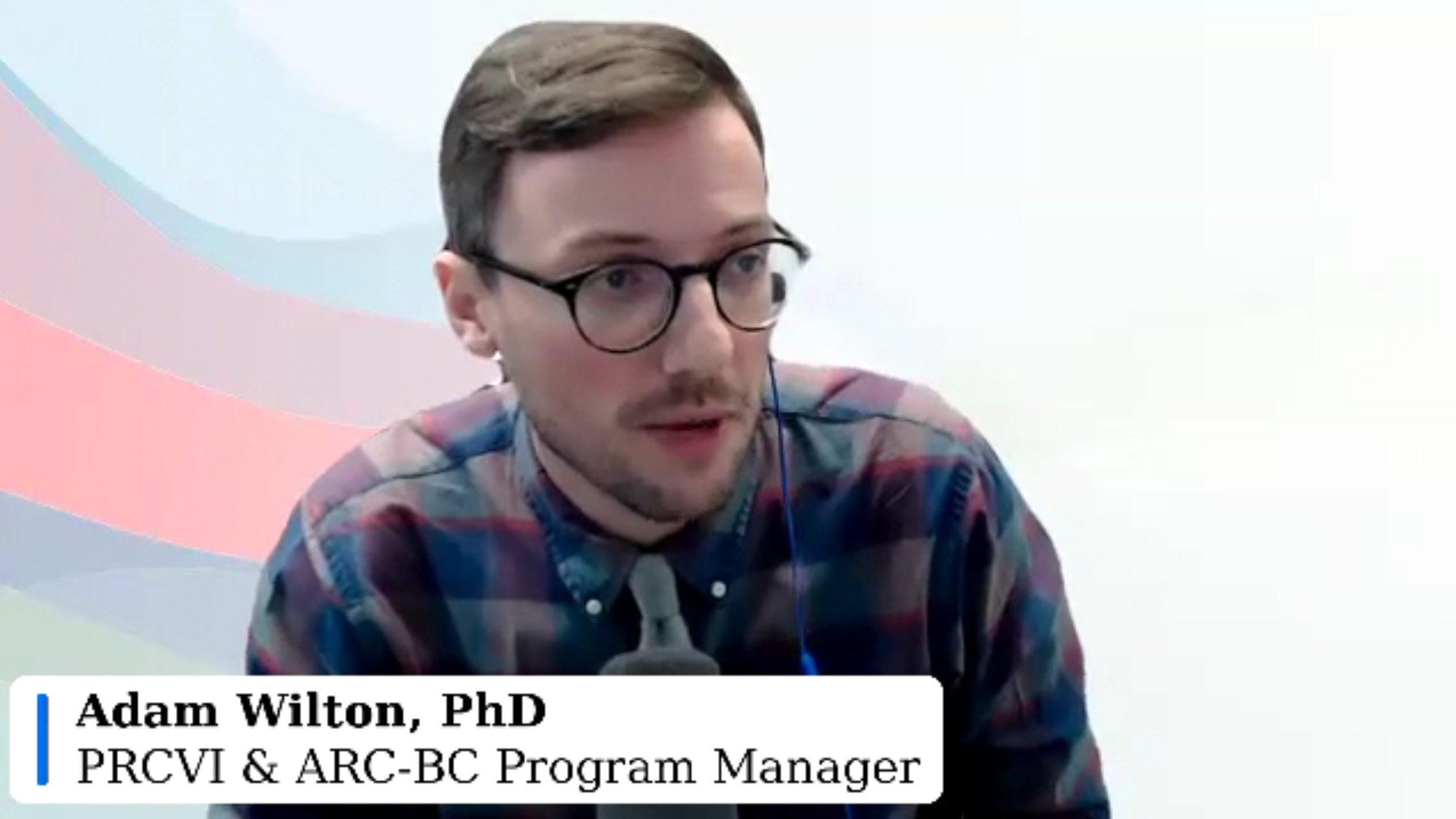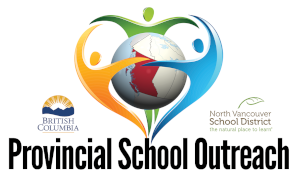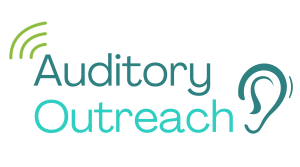BCPOP
Conference
2024
REPLAY
POPcon 2024 Replay
Relive the excitement of the the inaugural BC Provincial Outreach Program Conference (POPcon) which took place on Oct. 25th, 2024 by watching these recordings of the sessions that were presented.
Introductions

Welcome
Land Acknowledgement by Dr. Brad Baker, Superintendent of Indigenous Education, followed by opening remarks by Colin Reid, President of BC CAISE. Each Provincial Outreach Program (POP) Lead briefly introduces themselves and their program.

Program Overviews
Each program provides a three minute overview of their program, who they support, and how they deliver their services.

Q&A
Adam Wilton from PRCVI leads the Question and Answer session.
Breakout sessions

Accessibility Tools to Support Literacy
Learn how Set-BC provides BC students, classrooms, schools, and districts with the services, technology, and support needed to better educate students with complex needs.


Supporting Literacy through the use of Experience Book
Supporting Literacy through the use of Experience Book with Students who are Visually Impaired, Blind, or Deafblind
Join Adam and Jen from the Provincial Resource Centre for the Visually Impaired (PRCVI), and Annie and Allana from the Provincial Outreach Program for Deafblindess (POPDB), as they discuss the importance of literacy for students with visual impairments, blindness, and deafblindness. Learn about the benefits of creating experience books with students to support literacy programs that enhance concept development, social interactions, and expressive and receptive communication.

Foundation for Inclusion
Quality of Life as the Foundation for Developing Education Programs for Students with Complex Needs
Inclusive Outreach (IO) services are provided by a transdisciplinary team of teachers and therapists and are grounded in the philosophy that educational programs for these students must be intentionally designed to enhance current and future quality of life. This presentation will describe IO's Principles of Inclusion and five Quality of Life Indicators and how they are used to help school-based teams design meaningful, inclusive programs for students they support.
Quality of Life Indicators
- Presence
- Choice
- Competence
- Respect
- Inclusion

Using an FASD-Informed Approach to Support Complex Learners
Did you know that the estimated prevalence of FASD is 4% (1 out of 25 learners) and that the majority of students with FASD will not have a diagnosis?
This workshop by the Provincial Outreach Program for Fetal Alcohol Spectrum Disorder (POPFASD), will help develop a basic understanding of Fetal Alcohol Spectrum Disorder (FASD) and then explore how we can use an FASD-informed approach to support complex learners, with and without a diagnosis. Universal and specific classroom-based strategies will be covered, and are available as a take-away through their FASD 101 resource package.

Supporting K-3 Literacy Instruction
Meet the Provincial Outreach Program for the Early Years (POPEY) and learn about all the services, supports, and literacy resources they provide to primary Teachers in BC. They also share some of their favourite evidence-based literacy strategies and routines that you can use with your students immediately.

Enhancing Provincial Support for Rural and Remote School Communities
As Provincial School Outreach (PSO) begins it's second year of operation, it is looking for input and feedback in terms of how best to support classrooms and school communities in rural and remote locations. In addition to hearing from a panel of district administrators who work in rural and remote communities, the session will provide attendess an opportunity to share their perspective on how PSO can be most effective in terms of its service delivery. Areas of discussion will include, but are not limited to, what is most useful in terms of a referral process, how can consultants best support classroom teachers and educational assistants both virtually and during in-person outreach, what areas of professional development are of highest priority, and how the program can help build networks of professional practice that meaningfully connect school and district personnel who work in rural and remote locations across BC.
Breakout sessions

Jumpstarting Accessible Design with ARC-BC
With Accessibility Committees across the K-12 system working to prioritize equitable access to learning, now is a great time to increase your knowledge in creating and curating digital accessible learning materials like handouts and worksheets. Join the team from the Accessible Resource Centre - BC for some starter strategies that educators can begin using today to make their learning materials more accessible for diverse learners.


How AI can help you! A Workshop for Teachers and School Staff - Part 1
In this two-part workshop, Doug (SET-BC) & Myra (POPARD) will offer live demonstrations of how various AI tools can be used by school staff to create, enhance, and support inclusive education lessons in their classrooms. They’ll focus on the use of free and openly available AI platforms that can do a lot of the heavy lifting for educators who have to adapt their teaching plans to the wide variety of student profiles in classrooms today. Specific tools for teaching literacy will also be presented.

Supporting Literacy Development in Students with Fetal Alcohol Spectrum Disorder (FASD)
Fetal Alcohol Spectrum Disorder (FASD) can significantly hinder a student’s literacy development, impacting their entire learning journey. This workshop by the Provincial Outreach Program for Fetal Alcohol Spectrum Disorder (POPFASD) provides an understanding of FASD’s impact on literacy skills and offers practical strategies to support these students. Join us to deepen your knowledge and acquire tools to better support the literacy needs of students with FASD. Together, we can make a positive difference in their educational experience.

How We Learn to Read: The Reading Brain and Foundational Literacy Skills
Join the Provincial Outreach Program for the Early Years (POPEY) as they share evidence-based research on how we learn to read, as well as the foundational skills, strategies, and routines that support early reading and writing development.

Using Calendar Systems to Support Literacy with Students with Congenital Deafblindness
Join Meaghan and Ann from the Provincial Outreach Program for Deafblindess (POPDB) as they introduce how calendar systems are used with students who have congenital deafblindness and how they can help students achieve their literacy goals.

Assistive Listening Equipment - Overview, Tips and Tricks
This session by Auditory Outreach will go over the different types and pieces of assistive listening equipment that are available for students who are Deaf or Hard of Hearing, as well as strategies for use and implementation in the classroom.
Breakout sessions

Evidence-Based Tools for K-3 Literacy Assessment
An exploration of literacy screeners, diagnostic tools, and progress monitoring in the primary grades. The Provincial Outreach Program for the Early Years shares how these assessment tools work, and how they can inform our literacy instruction and interventions.

What Makes Literacy Inclusive?
The term literacy makes us think about books and students learning to read and write using printed words on paper. Literacy also includes being able to communicate, to take in, and to share information in a wider variety of ways. Literacy instruction in schools must reflect the diversity of the school and community. We need to prepare students to use literacy by ensuring the use of:
- Materials, both traditional and technology based
- Individual learning styles
- Different types or forms of literacy including
- visual, textual, digital, and technological
Activities can be designed that include a range of options in which literacy is accessible for all students, including books, magazines, dance, movies, photos, symbols, and audio texts.

Sensory Access for All Learners
Classrooms are sensory environments for all students. Join the outreach team from the Provincial Resource Centre for the Visually Impaired (PRCVI) as they look at the common sensory features of classrooms (e.g., lighting, colour contrast, complexity) and strategies for optimizing multi-sensory access to learning.

Vocabulary Building Strategies to Improve Literacy Outcomes
Join Speech Language Pathologist, Lora Baker, from Auditory Outreach to explore the connection between vocabulary and literacy outcomes. Hint, they are closely linked! Lora will provide some strategies to build vocabulary and reading fluency for many learners, including students who are Deaf or Hard of Hearing.


How AI can help you! A Workshop for Teachers and School Staff - Part 2
In this two-part workshop, Doug (SET-BC) & Myra (POPARD) will offer live demonstrations of how various AI tools can be used by school staff to create, enhance, and support inclusive education lessons in their classrooms. They’ll focus on the use of free and openly available AI platforms that can do a lot of the heavy lifting for educators who have to adapt their teaching plans to the wide variety of student profiles in classrooms today. Specific tools for teaching literacy will also be presented.

Communication and the 8 Magic Keys
The 8 Magic Keys are guidelines to developing successful interventions for all learners, including those with Fetal Alcohol Spectrum Disorder (FASD). Developed by Deb Evenson and Jan Lutke, the keys are: concrete, consistency, routine, specific, structure, supervision, repetition, simplicity, and relationship. Nicole Haines from the Provincial Outreach Program for Fetal Alcohol Spectrum Disorder (POPFASD) will present these keys from a communication and language based perspective, offering strategies and tools you can implement with learners of all ages immediately. Communication plays a role in every interaction, every learning opportunity, and every relationship.
We achnowledge the financial support of the Province of British Columbia through the Ministry of Education and Child Care
